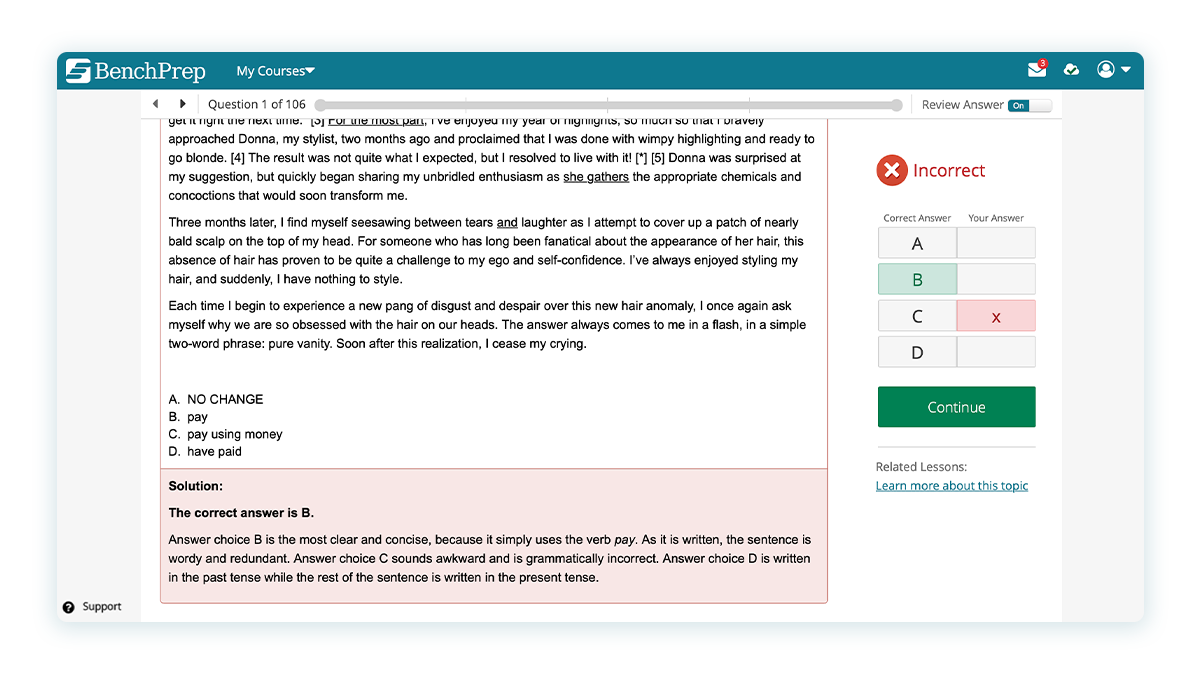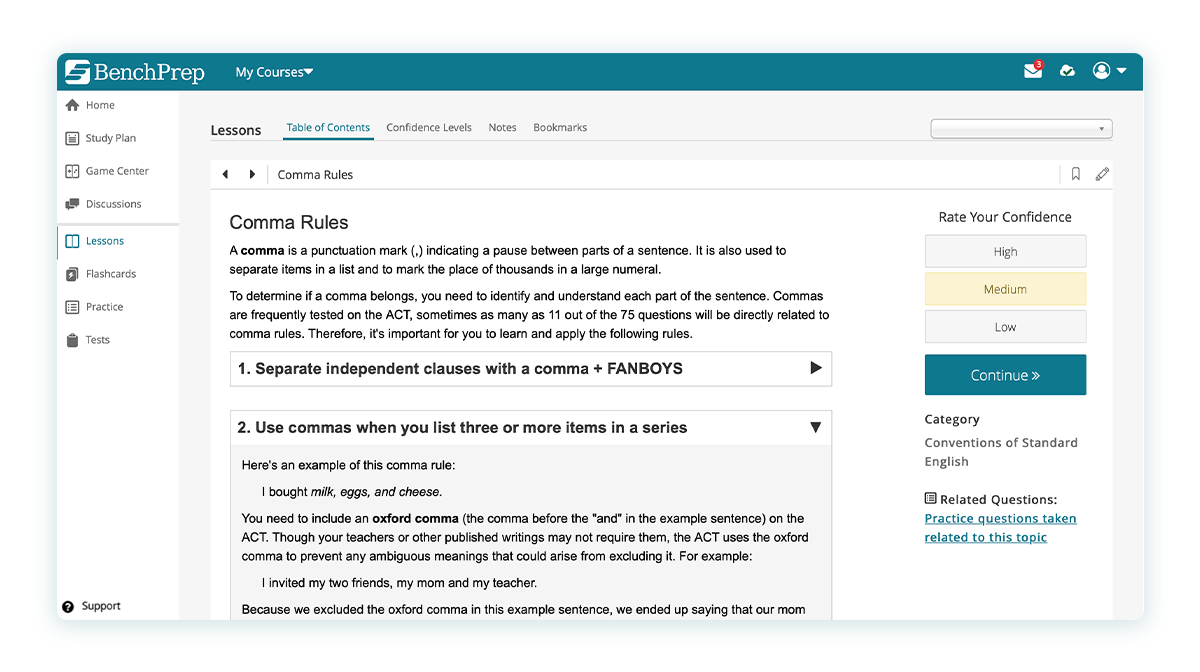How to Boost Learner Confidence in Your Online Test Prep Training Courses
Companies can boost learner confidence in online test prep training courses by providing personalized learner feedback. Learn how & why it's beneficial.
Confidence is a powerful tool. It helps with decision-making, it motivates us, and it gets us ready for our life experiences. And it's a powerful tool for test prep too. In fact, one recurrent finding is that learners who are confident in their test-taking abilities tend to perform better on high-stakes exams. Believing you can do something makes you more likely to pull off the feat.
Further proving the link between confidence and success, one group of professors at Singapore’s National Institute of Education conducted a series of tests on this correlation, examining how confidence directly affects test scores. They found that learners who believed they were skilled at math performed well on math tests. Researchers continue to corroborate that confidence acts as a clear-cut predictor of learner success.
As a learning program leader, then, you must prioritize building up your learners’ confidence leading up to your exams. Increased confidence can lead to better test scores and improved retention, bolstering your learning programs—and your return on investment (ROI). Leveraging personalized learner feedback can serve as a strong starting point.
This blog post discusses how to mold learner confidence in preparation for high-stakes exams by incorporating personalized learner feedback.
 Is Test Anxiety Linked to Low Scores and High Drop-Out Rates?
Is Test Anxiety Linked to Low Scores and High Drop-Out Rates?We all know somebody—if not ourselves—who experiences clammy skin and a twisted stomach before taking an exam. Unfortunately, testing anxiety can lead to low scores in high-stakes examinations for important credentials.
According to the Anxiety and Depression Association of America (ADAA), test-taking anxiety is linked to a fear of failure, poor test-taking history, and a lack of preparation.
Studying teenaged math students from around the world, researchers at the University of Chicago tried to understand how anxiety can manipulate the brain into inducing lower-than-expected scores. They found that students who outperformed their peers still weren't performing as well as they could have due to increased anxiety when taking tests.
Using behavioral neuroimaging studies, the researchers involved in this study found that anxiety inhibits one's ability to hold, manipulate, and remember information—three core ingredients for high math skills. Students who performed well had a higher capacity for information. But when they became anxious, the emotional systems in the brain interfered with their ability to retain information. While the study focused predominantly on young math students, its findings apply to adult learning initiatives. Anxiety affects almost 20% of the American population.
One of the best ways to curb anxiety for high-stakes exams is to increase learner confidence levels with personalized learner feedback, a valuable tool for test-prep providers.
Personalized learner feedback tells your learners why they've gotten a question right or wrong. Upon answering a practice test question—and filling out a corresponding confidence ranking—personalized learner feedback provides learners with links and resources to reinforce their correct answers and explain their incorrect answers. Akin to remediation, this feedback directs learners back to previous lessons to keep everything contained.
Topic knowledge and personal mindset go hand-in-hand. Your test prep training program must address both for your learners to be successful.
Too many test prep books and online courses encourage memorization rather than mastery. Through personalized learner feedback, learners better understand why the answer is A, instead of just memorizing that the answer is A. The goal is to reinforce mastering coursework over hyper-focusing on test scores.
Confidence-Based Learning Improves Test Performance
Confidence parallels performance in any professional learning environment. Your test-takers may unintentionally hold themselves back when they doubt their abilities. Therefore, confidence-building should be the foundation of any test prep training program, growing like a pyramid until learners—at peak confidence—are ready for the test.
Confidence-based learning assesses how confident a learner is in the answers they provide. Here's how it works. When learners answer a multiple-choice question, they choose their answer and rank their confidence the same time. If there are four choices in the multiple-choice question, then guessing still provides a 25% chance of being correct. However, determining a learner’s confidence level separates guesses from organically correct answers. Confidence-based learning also shows learners where they are highly confident yet incorrect. This reveals blind spots they might not have known they had, which helps them study more effectively.
Confidence-based learning in online test prep courses comes with two-fold benefits for learners, improving both their overall test performance and understanding of the material. After all, there's a reason learners refer to multiple-choice tests as multiple-guess. Instead of grooming your learners to guess when they don't know the answer with full confidence, it's better to evaluate what they don't understand and reinforce it through confidence-building initiatives.
Confidence-Weighted Testing As Personalized Learner Feedback
Let’s say an aspiring law student is preparing for the Law School Admission Test (LSAT). They’ll most likely encounter either true/false or multiple-choice questions that require extensive case law knowledge. Providing the answer and its reasoning helps them master the coursework, which reinforces the information in their brain and increases their ability to recall the information in their future career.
Confidence-weighted testing asks a two-pronged question: “What is the correct answer?” and “How confident are you in that answer?”
With confidence-weighted testing, a correct answer given with conviction is worth more than an uncertain one. On the other hand, incorrect answers given assuredly come with a heavy penalty—one heavy enough to dissuade any unwarranted pretense of confidence.
Confidence-Weighted Testing In Action
Seeking to enhance care for young patients with suspected sepsis, researchers used confidence-weighted testing to identify areas of misinformation among hospital staff, while providing real-time personalized learner feedback.
As a result, learners of all roles—including nurses, physicians, and advanced practitioners—achieved 100% mastery by the study's conclusion. Using eLearning bolstered by confidence-weighted testing, the study effectively provided upskilling education to frontline workers. And with personalized learner feedback, researchers ensured that the skills these professionals learned would stay with them for the rest of their careers.
Better Test Preparation Through Personalized Learner Feedback
Personalized learner feedback is a crucial rung on the confidence-building ladder. Without it, learners may risk reinforcing bad guessing habits. They may not understand why they got a question right or wrong, thus hindering their ability to retain knowledge.
Personalized learner feedback also allows learners to move at their own pace. In fact, LinkedIn's Workplace Learning Report found that 58% of employees preferred to learn on their terms. Instead of completing an assessment as quickly as possible—potentially forgetting much of what they learned—learners can leverage personalized learner feedback to reinforce what they already know.
Many learners often waste hours trying to understand something before seeking help. Personalized learner feedback recognizes concepts that learners find difficult and directs them to helpful resources to solve this. Ultimately, personalized learner feedback streamlines the journey from beginner to mastery.
BenchPrep understands the value of a learning management system (LMS) and the role of personalized learner feedback in test prep. By providing learners with practice assessments modeled after actual tests, you can drastically increase their confidence levels.
An LMS can track every dimension of a learner's performance and automatically adjust to their strengths and weaknesses. In turn, every question they answer is a step in the right direction.
What Exactly Makes Personalized Feedback Work For Learners?
In one study, researchers broke learner feedback into three actionable categories. Feedback must be task-focused and self-referenced, and it must identify the next steps. In other words, feedback must be relevant to the lesson, reinforce progress, and provide clear steps forward.
Researchers found that relevant personalized learner feedback also helped learners focus on their performance rather than that of their peers. Instead of fixating on the progress of one's coworkers, one can focus on one’s own progress, ultimately reaching the final destination at their own pace. Build Learner Confidence With an LMS Specialized for Test Prep Training Programs
Build Learner Confidence With an LMS Specialized for Test Prep Training Programs
 Build Learner Confidence With an LMS Specialized for Test Prep Training Programs
Build Learner Confidence With an LMS Specialized for Test Prep Training ProgramsLearning is no longer restricted to the classroom. An LMS allows learners to use any device from any location to take their test prep courses and receive feedback. And since self-paced study is imperative to learning, an LMS makes it easy for learners of all levels to engage wherever they are, whenever they like.
An LMS that focuses on personalized learner feedback helps build learner confidence, resulting in lower drop-out rates and greater chances for exam success.
BenchPrep's LMS helps training companies mold curriculum into a confidence-focused learning and professional development tool. Get in touch with BenchPrep today to discover the importance of building learner confidence with personalized learner feedback in your test prep training program.






